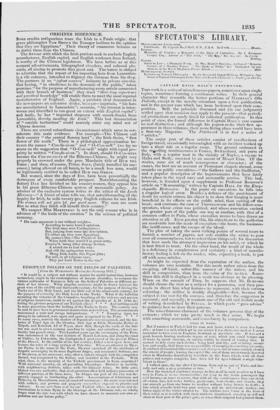" It would be a subject not without matter for
useful instruction, however melancholy might be the contemplation of human absurdity, to compare the various outbreaks of European folly on the tields of Palestine at different pe- riods of her history. What singular contrasts might be drawn between the great wars of the twelfth and thirteenth century, for the purpose of driving the Turks out of the Holy Land, and the little war of the nineteenth century, for the purpose at' restoring the Holy Land to the Turks. What it' the bulletins recording the victories of the Crusaders, breathing all the violence and passion of religious fanaticism, could be set against the &hatches of A. a 1840, de- tailing the glorious progress of our Turkish allies ! • • * And nothing could be more precarious than the holding of the Turks in Syria. The country may be said to have been in permanent insurrection and civil war. The mountaineers maintained a rude and savage independence. * * * "Usurping Agas, too strong to be subdued, were again and again recognized by the Porte. " * In ninny eases, scarcely the shadow of dependence was recognized, and the his- tories of Topa Aga on the Orontes, Said Aga at Mich, Mustapha Berber at Tripoli, and Kuteltuk Ali of Paytts, show that, though the name of the Sul- tan was used to give a seeming sanction to rapine and extortion, all real au- thority had passed away. Two hundred years ago the sovereignty of the Porte was undermined in the vast districts of Mount Lebmton, and along the coast of Galilee, by Fakreddin, the distinguished predecessor of the present Prince of the Druses. In the middle of the last century, Daher seized upon Acre, and became the ruler of a large portion of Palestine. When overthrown by Hjez- zar Pasha, in the name of the Porte, Djczzar exercised all the attributes of despotic sovereignty in its most flagitious shapes, and nominated Soli until, one of his slaves, as his successor; Who, after a violent struggle with his competitor Ismael, was recognized by the Sultan, and installed in the Pashalie. With what, then, is the memory of the Turkish government in Syria associated ? With universal anarchy, nu all-pervading brigdufloc. Districts in hostility with neighbouring districts, tribes with the adjacent tribes. So little esta- blished was any authority, that rival governors Mien held military possession of different portions of the same town. In Aleppo one part of the city was fre- quently engaged in bombarding the other. Assassinations of Christians and Hebrews, by Mussulmans, were of constant occurrence; the roods were infested With robbers, and persons and property everywhere exposed to plunder and violence. In our new-born zeal for our Turkish allies, in our desire and de- termination to restore Syria to the blessings ,of the Ottoman rule, we wholly forget what the rule was with which we have chosen to associate our own re- putation and our future policy."






















 Previous page
Previous page